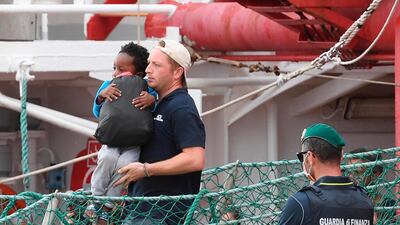From the US to Turkey, world leaders are increasingly closing their borders to those seeking refuge in their countries, as a wave of xenophobia washes over the world. But this month, Italy has begun what may become a reversal of this trend.
The departure of former Italian deputy prime minister Matteo Salvini of the far-right Northern League, whose government had instituted anti-immigration policies preventing rescue boats from docking on Italy’s shores, paved the way for a new government to be sworn in this month. Giuseppe Conte, on his second mandate as prime minister, has formed a coalition government consisting of centrists from the Democratic Party and members of the anti-establishment Five Star Movement. This coalition has allowed for a more humane treatment of migrants rescued at sea by opening Italian ports to two charity rescue vessels.
Europe’s leaders have rewarded this rare display of humanity. This week, the interior ministers of Germany, France, Italy and Malta have signed a proposal to relocate those rescued at sea more equitably. The plan is a “temporary emergency mechanism” that would allow migrants to move to a volunteer EU state. The end goal is for this voluntary scheme, which will be presented to EU interior ministers next month, to be adopted by a large number of European states.
But countries headed by far-right hardliners are unlikely to approve the plan. Hungary’s Victor Orban had previously said his nation would not accept any asylum seekers under an EU relocation scheme. It is true that the Dublin Regulations, Europe’s main legislation on migration, are flawed. Today, people seeking asylum in the EU fall under the responsibility of the first member state they set foot in, leaving Mediterranean countries with shaky economies such as Greece and Italy to welcome a disproportionate number of those who make the crossing from North Africa. The result has been a surge in xenophobic sentiment and anti-refugee policies. Earlier this year, Mr Orban told a German newspaper that he sees refugees as “Muslim invaders”. And this trend extends beyond Europe’s borders. American President Donald Trump has defended his country’s right to “protect” its borders in his speech to the UN General Assembly, and on the other side of the world, Lebanese Foreign Minister Gebran Bassil refuses to call Syrians refugees, referring to them as migrants. This rhetoric amounts to little more than baseless fear-mongering.
In reality, refugees make up less than 0.5 per cent of Europe’s total population, while the total number of displaced people worldwide is higher than ever before. This is because refugees will often flee to bordering countries, such as Turkey or Pakistan, instead of seeking shelter faraway. These countries need additional aid to provide for their refugee population. Developed nations have a duty to share this responsibility, and the EU’s announced plan is a positive step in this direction. Whether they are fleeing war, poverty or gang-related violence, people should never be punished simply for seeking a better future.

